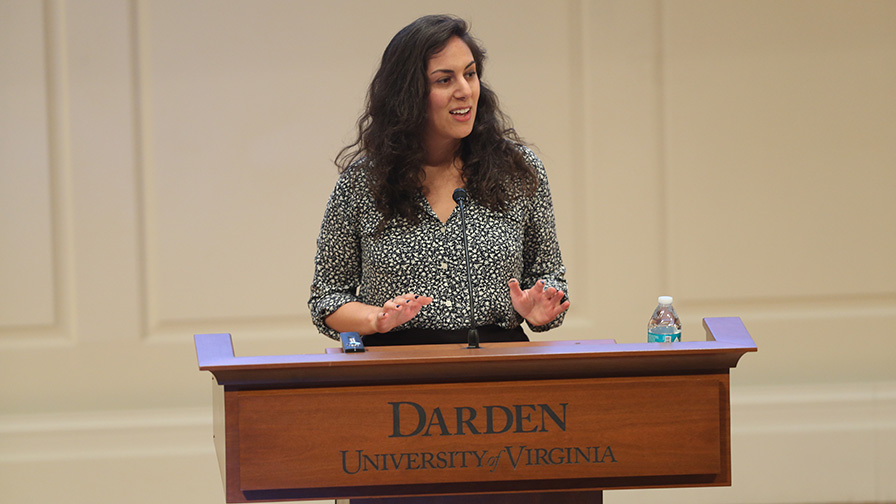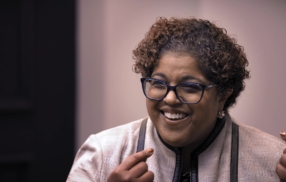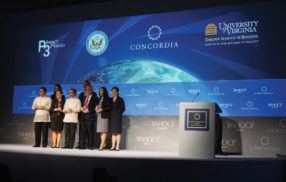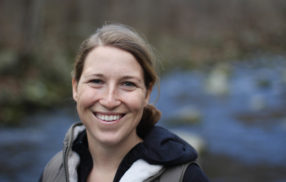
UVA Darden Business in Society Week Examines Opportunities for ‘Better Business, Greater Good’
By Jay Hodgkins
University of Virginia Darden School of Business students upped the ante in their focus on responsible leadership this year, expanding the annual Business in Society Conference into a full week of events from 21-24 March to examine opportunities for changing the way business and society interact through new business models, new products and new ways of thinking.
The 2016 Business in Society Week theme of Better Business, Greater Good was driven home on 22 March with a Leadership Speaker Series address from John Mackey, co-founder and co-CEO of Whole Foods.
“Purpose is everywhere,” Mackey said, for leaders willing to stretch beyond analytical management to move away from a purely profit-focused perspective of business.
The second annual Impact Investing Forum, hosted by the student-run Darden Impact Ventures and Net Impact clubs, took center stage on 23 March.
With the backdrop of an explosion of popularity in impact investing, particularly among Millennials, Darden Professor Elena Loutskina moderated a panel including Kristine Leary of Cambridge Associates, Alla Jezmir of CCM Energy, Liz Doerr of New Richmond Ventures, Ben Cullop of Manchester Capital and Ross Baird of Village Capital that examined why investors choose to place their money in impact funds and challenges to generating both financial returns and positive societal impact.
Doerr noted a financial reality — most of the money available for investing today is in the hands of experienced investors who may not be prone to considering alternative investment strategies. That demographic has not been particularly interested in impact investing, Doerr said, so in many ways the hype surrounding impact investing has outpaced the demand for impact funds. But the panelists saw potential for a major shift as the world’s wealth transitions from one generation to the next.
“More than $41 trillion is going to shift hands in the next 40 years to Millennials,” Jezmir said, and Millennials have expressed a strong and consistent interest in impact investing. “I’m very optimistic about the growing emphasis on achieving social and environmental objectives in addition to financial returns. But the shift is going to be slow and gradual over decades. It’s not going to happen right away.”
Cullop said he is interested to see whether Millennials genuinely think differently than prior generations and will remain committed to using their wealth to positively impact society, or if they will focus more exclusively on top financial returns like their parents as they age. It’s a question that no one knows the answer to yet, he said, but there is evidence to support both potential outcomes.
Perhaps the most important question on the table, though, was: Can impact investing compete with traditional investing criteria in delivering comparable returns?
Doerr insisted that if investors demanded opportunities for impact investing, it was incumbent upon investment professionals to listen to their clients and find a way to deliver competitive funds.
There are several ways to help impact funds deliver competitive returns, according to Cullop. First, in the selection process, successful investors are “very specific,” not just adding companies that make a positive difference to their portfolios, but focusing on those in specific sectors with proven returns. Finding impact investments involving firms with the most talented founders is another selection strategy, although Cullop said the teams around founders in the impact space often have room to improve. Lastly, after an investment is made, firms like Manchester Capital can boost returns by actively helping their portfolio companies develop operationally.
Loutskina summarized the discussion by calling impact investing a “very nascent sector,” one that faced the constraints of investing realities but also holds tremendous potential.
Business in Society Week opened 21 March with a discussion of the future of fintech with CommonBond’s Yamile Nesrala and closed 24 March with a session on innovative health care for emerging markets led by Dr. Daniel Grossman, senior director for Global Health Innovation at Medtronic. Both were presented by the Net Impact club.
The University of Virginia Darden School of Business prepares responsible global leaders through unparalleled transformational learning experiences. Darden’s graduate degree programs (MBA, MSBA and Ph.D.) and Executive Education & Lifelong Learning programs offered by the Darden School Foundation set the stage for a lifetime of career advancement and impact. Darden’s top-ranked faculty, renowned for teaching excellence, inspires and shapes modern business leadership worldwide through research, thought leadership and business publishing. Darden has Grounds in Charlottesville, Virginia, and the Washington, D.C., area and a global community that includes 18,000 alumni in 90 countries. Darden was established in 1955 at the University of Virginia, a top public university founded by Thomas Jefferson in 1819 in Charlottesville, Virginia.
Press Contact
Molly Mitchell
Senior Associate Director, Editorial and Media Relations
Darden School of Business
University of Virginia
MitchellM@darden.virginia.edu






